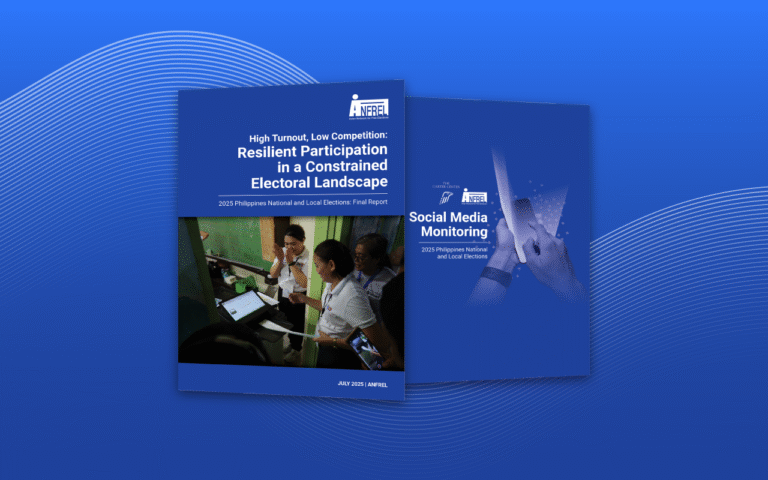DOWNLOAD THE FULL REPORT: “High Turnout, Low Competition: Resilient Participation in a Constrained Electoral Landscape | 2025 Philippine Elections Final Report”
EXECUTIVE SUMMARY
The Asian Network for Free Elections (ANFREL) commends the people of the Philippines for their robust participation in the 2025 National and Local Elections on 12 May 2025. These midterm elections occurred in a politically charged environment, with rising polarization, the enduring influence of political dynasties, and an evolving digital information landscape. Despite these challenges, voter turnout reached a record 82.2%, underscoring the deep civic commitment of Filipino voters.
ANFREL deployed a team of 21 international observers across 11 regions, supplemented by core analysts and a support team in Manila. The mission observed the full electoral cycle, from the pre-election period and campaign environment to Election Day and the post-election processes. At all stages of its work, ANFREL’s mission team and observers in the field were guided by recognized election observation principles, international standards and obligations.1
The Commission on Elections (COMELEC) demonstrated strong institutional commitment, introducing new resolutions, strengthening early voting hours and accessibility measures, and increasing transparency through livestreamed audits, source code reviews, and greater communication with local civic organizations. The automated election system, including the Random Manual Audit (RMA), was implemented effectively and achieved 99.997% accuracy, reinforcing public confidence in the technical process. Civil society organizations such as the Parish Pastoral Council for Responsible Voting (PPCRV), Legal Network for Truthful Elections (LENTE), and National Citizens’ Movement for Free Elections (NAMFREL) played essential roles throughout, review of legal framework, contributing to verification efforts, voter education, actual election monitoring and electoral reforms.
Nonetheless, several systemic issues continue to undermine electoral integrity. Electoral competition was constrained in many areas, with one in three districts witnessing uncontested races. The pervasive influence of political dynasties and the co-optation of the party-list system limited voter choice and pluralism. Vote buying remained widespread and sophisticated, often facilitated through digital platforms like GCash, and the abuse of state resources persisted in both urban and rural localities. In 40% of areas observed, government resources were being used for campaigning, while in 30% of areas, voters reported being offered additional government assistance during the election period. Despite notable efforts to respond to these issues, COMELEC continues to face limitations in its jurisdiction, with violations outside of the election period falling out of its official purview.
Campaigns were also largely driven by personalities rather than policies. While many voters remained enthusiastic and engaged, there was a prevailing sense of disillusionment, even apathy, with the broader political system. Stakeholders frequently expressed concerns about vote buying, dynastic politics, and the absence of substantive policy debates. Despite these frustrations, the commitment to participate in democratic processes remained strong.
Inclusion efforts were generally positive, with some improvements in accessibility for voters with disabilities, senior citizens, pregnant women, indigenous peoples, and persons deprived of liberties. This includes implementing special voting procedures for these aforementioned sectors, maximizing malls as voting centers, and some new accessibility features in the automated counting machines. However, implementation varied widely across precincts, and barriers to participation persisted in some remote and indigenous communities, as well as for some voters with specific accessibility needs.
ANFREL concludes that while the 2025 elections were generally well-administered, deep-rooted structural challenges continue to compromise the credibility and competitiveness of the electoral process. Sustained reforms, particularly in campaign finance, party-list regulation, and abuse of state resources, are essential to strengthening electoral integrity and fostering democratic accountability in the Philippines. ANFREL calls for continued engagement between COMELEC, civil society, and political stakeholders to address these issues and ensure more inclusive, competitive, and transparent elections in the future.
The 2025 midterm elections took place against a broader electoral backdrop, with two critical polls on the horizon: the Barangay and Sangguniang Kabataan Elections (BSKE) and the first parliamentary elections in the Bangsamoro Autonomous Region in Muslim Mindanao (BARMM). These upcoming elections are both scheduled later this year, despite current calls by some legislators to postpone the BSKE. These upcoming elections carry immense significance for local governance, youth representation, and the political future of the new autonomous region. Lessons from these midterm elections, particularly around accessibility, communication, electoral dispute resolution, and the use of new automated counting machines (ACMs) will be essential for building public confidence and institutional preparedness in these subsequent elections over the next year.
DOWNLOAD THE FULL REPORT: “High Turnout, Low Competition: Resilient Participation in a Constrained Electoral Landscape | 2025 Philippine Elections Final Report”
ANFREL_2025-Philippines_Final-Report_ol

